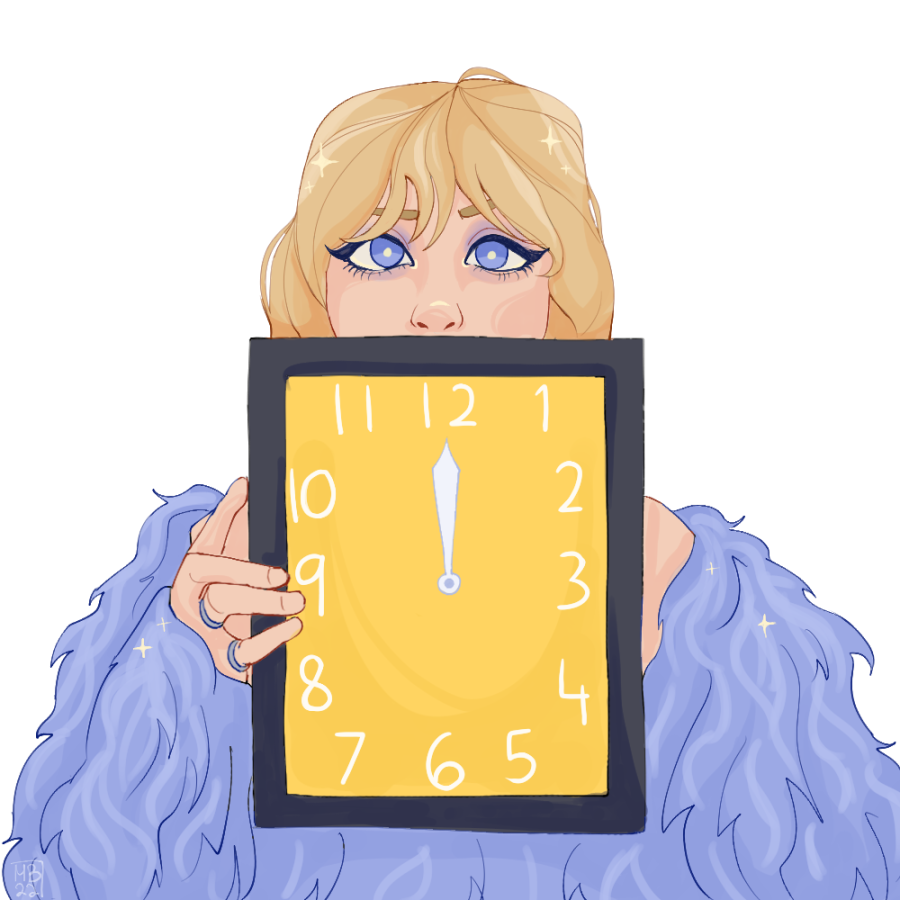“Midnights”: More market than music
Taylor Swift’s Midnights Album has finally released, giving it a listen is a must.
December 5, 2022
On October 21st, Taylor Swift released her tenth studio album, “Midnights.”
Taking a page out of K-Pop’s book, this release was preceded by an expansive marketing campaign. 20 separate versions of the album were simultaneously released on multiple formats. Taylor Swift’s official website sells four different vinyl versions alone, even offering officially branded vinyl-holding clocks (when arranged correctly, they form a 12 hour face) and cases to keep each pressing safe and displayed. Oddly enough, the “3am Edition,” effectively the definitive edition, is sold solely on streaming platforms. Releasing this online simultaneously with the rest of these products seems like it would ruin the appeal of purchasing physical copies. Of course this would never dissuade collectors, but there must surely be a number at which “collector focused” marketing becomes lunacy.
Apparently that number has yet to be reached, as most physical retailers are selling out constantly. In fact, the album has broken more than just physical records, becoming the most streamed album ever on Spotify and Apple Music in less than 24 hours. With sales to rival “Thriller” and more hype than Black Friday, how does this already mythical album actually sound?
The curtains open on “Lavender Haze.” The track is immediately awash in sub bass that appears throughout the album, setting a tone that matches the title of the album, as well as the opening refrain, “meet me at midnight.” A soundscape of dark toned synths and pitched down vocals rises out of a lowpass filter over a driving electronic beat, evoking something akin to preppy Billie Eilish. The unchanging three chord progression, mixed with lyrics centered around ignoring public opinion, make this track feel like a mature “Shake It Off.”
This theme of repetition is persistent: progressions, structures, and sounds are recycled between tracks, with every song feeling like something that can be found in different form elsewhere in Swift’s discography. Sometimes songs even feel recycled from earlier in the album, enough to make a casual listener check their phone once or twice. The redundant slog seems to discourage completion, outstaying its welcome shockingly quick and giving you nothing but the hope of something new to keep you from stopping it altogether. Mix in the lyrics and it becomes almost exhausting.
Swift shows no mercy as she beats you over the head with her self described “melancholia,” featuring blunt songwriting that leaves nothing to imagination. “Anti-Hero” is a perfect example, the whole track a never-ending stream of what sounds like one side of a therapy session. As she rants about insecurities in a way that’s comically bland, she somehow still attempts to romanticize it all. Her writing style has taken a dip this time around, losing what used to be charming and relatable, and leaving awkward and emotionless passages in its absence. Lines like “sometimes I feel like everybody is a sexy baby, and I’m a monster on the hill” read less like the emotional cuts of someone who’s 32, and more like the ramblings of a 14 year old who just discovered Twitter.
“Snow On The Beach” opens with a lush and well produced string section, only to be let down by a monotone beat and a frustratingly pointless Lana Del Rey feature. “Bejeweled” sounds like a buried preset on a MicroKorg, along with most of the synth sounds across the album. “Vigilante S** t” feels like a track better placed on “Reputation” and forgotten, along with the rest of “Reputation.” It also highlights a quirk of Swift’s vocal delivery: vulgarities. Every curse feels gratuitous and unnecessary, and the delivery sounds as if she’s just asked her parent’s permission. As a pointless adjective, or as a cheap attempt at edginess, it comes across like a fourth grader who just discovered the f-bomb. “Karma” is no different in its writing. “Karma is a cat, purring on my lap ’cause it loves me,” sums up the entirety of this song’s ridiculous nine line refrain, featuring a machine gun blast of comical analogies.
“Sweet Nothing” is a simple, well composed, beautiful break from the rest of the fodder. An electric piano lays down what feels like the first real melancholy of this album, and sung over it is a catchy, rhythmically interesting vocal line. Soft horns back deeply honest lyrics, using reverb sparingly instead of drowning in it.
This song opens what feels like a different album entirely, but only for listeners of the “3am Edition.” From here on lyrics feel full of emotion, well crafted and executed as on previous albums of hers. The sonic improvement culminates in “Glitch.” Combining big, heavy hitting harmonies and serotonin inducing basslines against a chill backdrop, it’s the highlight of the bonus tracks. It’s upsetting to see songs like this left to rot on the tail end of a special edition. If made up of tracks 12 to 20, the album may have been more musically satisfying.
Admittedly, many of these tracks are from the entirety of her career, some of them possibly written when she was close to 14. This begs the question: Why release this collection of what are effectively remastered vault demos as an album? It’s comparable to Prince releasing “The B-Sides” as a follow up to the “Love Symbol” album. Following “Evermore,” Swift has begun reclaiming old albums from her prior music label for herself. This is a wonderful display of independence, but it also means there has been nearly nothing original from her since 2020, barring a single or two. For someone who drops an album every two to three years, and with a marketing campaign of this scale, the album starts to feel either like a cash grab or an incredible middle finger to Big Machine Records. Taylor Swift is at a point where she can release a collection of throwaway songs that didn’t make the cut for her label and still end up with a No.1 album.
“Midnights” certainly sets a mood, but it’s one that leaves the future of Taylor Swift uncertain. Cash-grabbing marketing and a string of reruns all for an album of previously written songs sends the message of an artist running out of creative steam. Even if it’s an incredible revenge note to her previous record label, it feels less like “a return to pop” and more like a step backward. Maybe “Midnights” is best kept on your Swift branded clock than on your record player.



